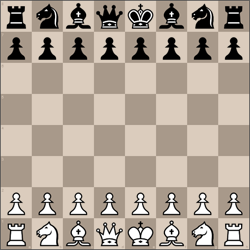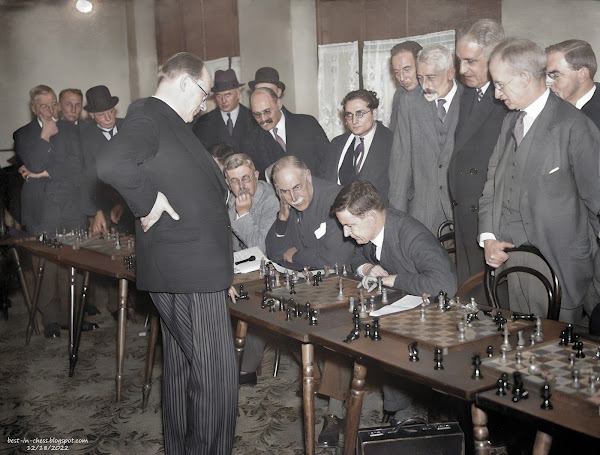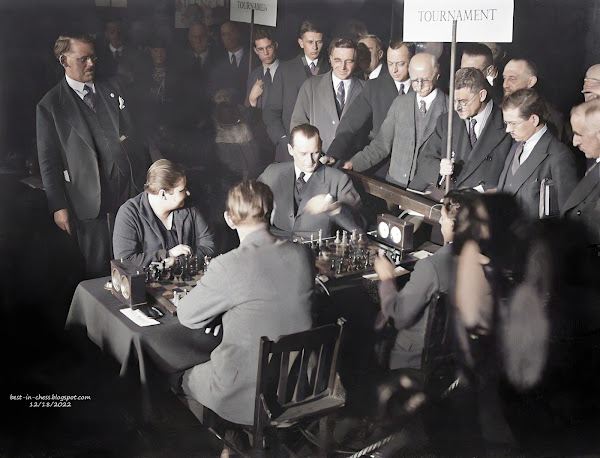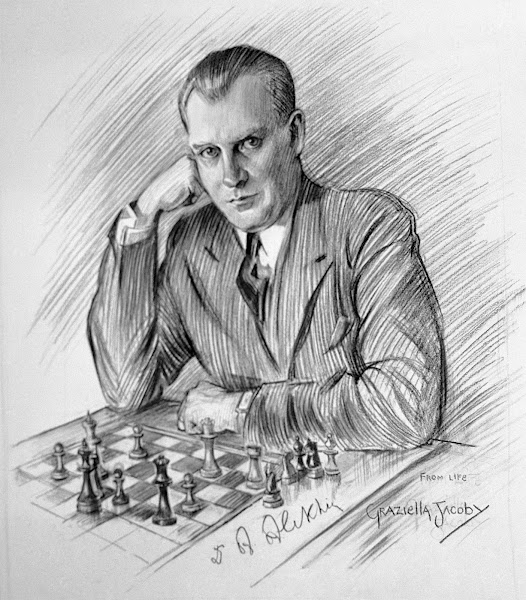1932
January 29 1932
February 01 1932
February 02 1932
February 03 1932
February 04 1932
February 05 1932
February 06 1932
 International Chess Festival 06 Feb 1932, Sat Cheltenham Chronicle and Gloucestershire Graphic (Cheltenham, Gloucestershire, England) Newspapers.com
International Chess Festival 06 Feb 1932, Sat Cheltenham Chronicle and Gloucestershire Graphic (Cheltenham, Gloucestershire, England) Newspapers.com
The first “Chess Festival” promoted and financed by a newspaper was opened at the Central Hall, Westminster, on Monday, and continued there all week. The second half will be conducted at the “Empire Social Chess Club,” at Whiteley's Stores, Bayswater, W., from Monday next to Saturday, when the prizes will be presented. The Congress is the only event of its kind and magnitude held in London since 1922. As we have previously mentioned it is provided by the “Sunday Referee,” and it is managed by Mr. W. Hatton-Ward, that journal's chess editor. There are no entry fees, and admission to see the play is free, by ticket, to be obtained from Mr. Hatton-Ward, “Sunday Referee,” 17 Tudor-street, London, E.C.4. But probably any player can easily gain admission next week at Whiteley's.
The chief tourney is the International Masters', with twelve competitors—Dr. Alekhine, Dr. Tartakower (Poland), Geza Maroczy (Hungary), Koltanowski (Belgium), I. Kashdan (U.S.A.), Salo Flohr (Czechoslovakia), Mir Sultan Khan, W. Winter, V. Buerger, and P. S. Milner Barry—who not many years ago was of Cheltenham College and at that time won the British Boys' championship.
Dr. Alekhine had a great reception when he appeared at the Empire Social Chess Club on Friday of last week and engaged in simultaneous play against twenty-four strong London opponents. He won all but two games, which were drawn by Dr. F. Duncan and Mr. A. Streeter. Another end encounter was fixed for to-day (Sat.) at 7 p.m. at the Central Hall, Westminster.
One of the prize tourneys is for women, and the entries include the strongest in this country except Miss V. Menchik. Her sister, Olga, is one. Both were playing in Cheltenham a few years since. There is considerable difference in chess strength.
The prizes.—These are, in the “Masters' Tourney”: 1st £50, 2nd £30, 3rd £20, 4th £10. In the “Premier Reserve”: 1st £10, 2nd £5, 3rd £3, 4th £2. And the same in women's tourney. Some anonymous chess patron gives £10 for the most brilliant or “best recovery game” played during the Festival.
February 08 1932
February 09 1932
February 10 1932
February 11 1932
February 12 1932
February 28 1932
World champion Alexander Alekhine photographed at the Claridge Hotel during a chess tournament in Paris, France, February 28, 1932. During the exhibition he played simultaneous games against three hundred people over sixty boards.
February 29 1932

The Boston Globe, Boston, Massachusetts, Monday, February 29, 1932
Alekhine, Chess Champion, Plays 300 Men in Paris
Paris, Feb 28 (A.P.)—Alexander A. Alekhine, world chess champion, matched against 300 opponents tonight in a benefit for French war veterans, playing on 60 boards with five players for each board, won 37 of the games, drew 17 and lost six.
March 25 1932
March 26 1932
March 27 1932
June 1932
July 03 1932
July 08 1932
July 09 1932
July 16 1932
July 17 1932
July 18 1932
July 19 1932
July 20 1932
July 21 1932
July 22 1932
July 23 1932
July 24 1932
July 25 1932
July 26 1932
July 27 1932
July 28 1932
July 29 1932
July 30 1932
August 09 1932
August 15 1932
August 16 1932
Alexander Alekhine (1892-1946), Isaac Kashdan (1905-1985), J. J. Araiza (1900-1971), Samuel Reshevsky (1911-1992), Harry Borochow (June 15, 1898-October 20, 1993), and Arthur W. Dake (1910-2000) gather for World Chess Congress, Pasadena, 1932. Photo by Los Angeles Times.
Similar photograph appears with the article, “Chess Wizards Open Congress,” Los Angeles Times, 16 Aug 1932. The chess masters of the world are attending a two-week battle royal at the Hotel Maryland in Pasadena, competing in the World's Chess Congress.
Isaac's hand is poised over the table, he and Dr. Alekhine looking into the camera from where they are seated across from each other. The rest of the men stand around their table, Captain Araiza looking at the chessboard while the other men look into the camera.
Source: UCLA/Los Angeles Times.
August 17 1932
August 18 1932
August 20 1932
Participants in the Pasadena 1932 Tournament. Dr. Alexander Alekhine (Seated), World Chess Champion, at World Chess Congress, Hotel Maryland, Pasadena, California. Standing, left to right—Fred Reinfeld, Harry Borochow, A. J. Fink, Reuben Fine, Jacob Bernstein, Samuel Reshevsky, Herman Steiner, Isaac Kashdan, Captain J. J. Araiza, Arthur W. Dake and Samuel Factor.
August 21 1932
August 22 1932
 Chess King's Eye Hypnotic 22 Aug 1932, Mon The Los Angeles Times (Los Angeles, California) Newspapers.com
Chess King's Eye Hypnotic 22 Aug 1932, Mon The Los Angeles Times (Los Angeles, California) Newspapers.com
Chess King's Eye Hypnotic
Personality Makes Pawn of Opponent
Pasadena, Aug. 21. (Exclusive) Just as scientists have been led for more than a decade by Dr. Albert Einstein, devotees of chess, most scientific of parlor pastimes, have been led during the same period by Alexander. “The Great” Alekhine (pronounced to rhyme with Einstein.)
The Chess Masters who have met and been defeated with ease by Alekhine in the International Chess Congress, now in session here, assert that the world's chess champion exerts an unconscious hypnotic influence over his adversaries.
“It wasn't that he is the greatest chess tactician who ever lived there's no doubt of that but it was the overpowering force of his personality that got me,” declared an expert after Alekhine had defeated him.
Two defeated adversaries, in comparing notes, agreed that “When you play with Alekhine, you have the peculiar feeling that some one is staring at the back of your head.”
The world's champion has studied psychology all his life, but denies that he makes conscious use of this knowledge in his matches. Neither does he or any of the other Chess Masters use such tricks as tapping on the table or staring an opponent in the eyes to sidetrack the train of thought.
Mr. Alekhine, a high-born Russian, escaped to Paris from Russia during the revolution. He is now a citizen of France and practices law in Paris. During a game, he reveals a disturbingly calm and relaxed exterior, despite his rapid consumption of cigarettes and coffee.
While imprisoned in Germany during the World War, he developed “hyper-modern” chess without the aid of chess boards or pieces. Chess critics ascribe part of Alekhine's success to the oriental blood which is said to flow in many Russians' veins. Such oriental blood, it is asserted, would account for much of Alekhine's suave imperturbability.
A few days ago, the champion defeated Adolph J. Fink, twice California State champion, in exactly fourteen moves, thirty or forty moves commonly being required for a chess victory.
It is whispered that there is one man in the world whom Alekhine fears. This man is Capablanca, a Cuban, who also is asserted to exert an uncanny hypnotic influence. Although Alekhine won a closely contested contest from Capablanca a few years ago, thereby winning a $10,000 side bet, it is asserted he refused to play him at this congress unless he was given a guarantee of $2000.
The money was not raised and the world's second best chess player failed to attend the congress.
A drawing of Russian chess champion Alexander Alekhine, Pasadena, August 1932, Los Angeles Times.
The sketch of Dr. Alekhine, resting one fist against his face and in the middle of a chess game with an unseen opponent, is pinned to a wall. Photograph appears with the article, “Chess King's Eye Hypnotic,” Los Angeles times, 22 Aug 1932.
Dr. Alekhine has studied psychology all his life and after escaping from Russia to Paris during the revolution is now a citizen of France and a practitioner of law. Despite his rapid consumption of cigarettes and coffee The Great Alekhine displays a calm and relaxed demeanor.
Text from newspaper caption: Alexander (The Great) Alekhine The above pencil sketch from life, made my Graziella Jacoby for The Times, shows the Parisian chess wizard in the midst of a problem. (Source: UCLA/Los Angeles Times)
August 23 1932
August 24 1932
August 25 1932
August 27 1932
August 27, 1932, Arthur Dake and Alexander Alekhine meet over chess board at Pasadena's Maryland Hotel in the Pasadena International Chess Congress of 1932.
Pasadena Star-News, Pasadena, California, Chess by Douglas S. Houghton, Saturday, August 27, 1932
Chess
By Douglas A. Houghton
Pasadena Chess Congress of 1932 Nearing End; Dr. Alexander Alekhine Well In the Lead; Rev. Ohman of Nebraska Tops Minor Tournament; Miss Le Vieve Hines Unbeaten In Women's Contest.
Star News, August 27, 1932
Two days remain for the windup of the final sessions of the Pasadena International Chess Congress of 1932. Today and tonight in the chess arena at the Maryland Hotel the full quota of thirty contestants will swing into action. All adjourned games have been played off and the tenth and eleventh rounds will bring together the strongest players in each of the three tourneys.
Tomorrow, Sunday, at 1 p. m. the masters will meet in the final round of the international tournament. Dr. Alekhine, winner of the Berne, Switzerland, tourney, will encounter young Reuben Fine, winner of the Western championship title at Minneapolis three weeks ago. Harry Borochow, present California titlist, meets A. J Fink, three times winner of the California state championship; H. Steiner, former New York state champion. clashes with Fred Reinfeld, present New York state champ. Reshevsky vs. Dake and Factor vs. Kashdan will battle their strongest to break the .555 percentage tie in third to seventh place in the standings.
Chess enthusiasts and patrons will be thrilled at watching the games of the masters being reproduced move by move on the great wall boards Tournament Director Alexander V. Taylor has provided.
Tonight the master play starts promptly at 7 o'clock. Sunday the games are to start at 1 p. m. Admission to the chess arena is $1.
Pairings in the masters' round for tonight are: Fink-Steiner; Reinfeld-Factor; Kashdan-Reshevsky; Dake-Alekhine; Fine-Araiza; Bernstein-Borochow. Matches begin at 7 p. m.
Minor pairings are: Sullinger-Crain; Ohman-Spero; Bateman-Sobral; Jaffray-Woodward; Sheets-Broughton; Pearsall, bye. Play starts at 2 p. m.
Women's tourney pairings: Mrs. Hillman-Mrs. Wolff; Mrs. Hinchman-Mrs. Bain: Miss Fox-Miss Hines. Matches at 2 p. m., played in the patio of the Maryland Hotel.
Masters' Standings
W L Dr W L Pct
Dr. Alekhine 7 0 2 8 1 .888
I. Kashdan 3 1 5 5½ 3½ .611
H. Steiner 4 2 3 5½ 3½ .555
H. Borochow 4 3 2 5 4 .555
S. Reshevsky 4 3 2 5 4 .555
S. Factor 3 2 4 5 4 .555
R. Fine 3 2 4 5 4 .555
A. W. Dake 2 1 6 5 4 .555
F. Reinfeld 2 4 3 3½ 5½ .388
J. Bernstein 1 3 5 3½ 5½ .388
J. Araiza 2 6 1 2½ 6½ .277
A. J. Fink 1 7 1 1½ 7½ .166
Minor Standings
W L Dr W L Pct
Ohman 7 0 1 7½ ½ .537
Sobral 7 2 0 7 2 .777
Sheets 6 2 0 6 2 .750
Woodward 6 3 0 6 3 .666
I. Spero 4 2 1 4½ 2½ .642
Pearsall 4 4 1 4½ 4½ .500
Bateman 2 4 2 3 5 .375
Crain 2 5 1 2 5½ .357
Jaffray 2 6 1 2½ 6½ .277
Broughton 1 6 1 1½ 6½ .187
Sullinger 0 7 0 0 7 .000
Dr. Ohman's defeat of M. Sobral, his nearest adversary, puts him comfortably in the lead. This afternoon he is to play I. Spero and the game will be the high light of the session. Parings for Sunday, round No. 10, are: Sullinger-Broughton; Woodward-Sheets; Persall-Jaffray; Sobral, bye; Spero-Bateman; Crain-Ohman.
Women's Tourney
Minor Standings
W L Pct
Miss Hines 7 0 .1000
Mrs. Wolff 6 3 .666
Miss Fox 4 3 .571
Mrs. Bain 5½ 4½ .555
Mrs. Hillman 2½ 6½ .277
Mrs. Hinchman 1 7 .125
Dr. Alekhine in Simultaneous
One hundred players, fifty tables, two consulting players to a table, is the program for the great simultaneous exhibition to be given by Dr. Alexander Alekhine, the grand master Chess player and world's champion at the Los Angeles Athletic Club on Thursday evening, September 1.
The champion is willing to meet the 100 ablest players in California all together, by detachments or individually, confident of his ability to win .950 per cent of the games or better. The master faces the tougher proposition, the consultants having 50 minutes to his one to perfect their plans. The fee is $2 for each player or $4 a table for two consulting partners. Reservations should be made early with A. V. Taylor at the Pasadena Chess Congress, or addressed to Henry MacMahon, 9441 Wilshire boulevard, Beverly Hills.
The masters now participating in the Pasadena Chess Congress and all readers of this column will be interested in reading some items taken from the newspapers of New York and environs. Here is a leader from Col. Northrop's chess column in the Newark Evening News, headed:
“Alekhine at Pasadena”
“Dr. Alexander A. Alekhine, the world's chess champion, made a slow start in the California Chess Congress. Perhaps we should not exactly use the word slow: rather he did not go in with his usual rush tactics. There was a mighty good reason. He was not entering this contest with a full knowledge of the players and their strength is would have been the case in Europe. Here he was to meet for the first time several youngsters of great genius and unheralded chess knowledge.
“He takes chances in chess only after he has reached the analytical conclusion of soundness and safety. It is not at all uncanny, as some writers say: it is a braw canny mon, is he. Therefore he was taking no chances with a new crop of American stars, every last one of them like young bulldogs, ready to get a chance at the big one. Dr. Alekhine is a good chess player; he knew that every one of these youngsters had a thing or two up his sleeve, and that they had boned up on all the traps, Stamma, Ruy Lopez, Philidor, down to Marshall and Abe Kupchik. He had to be careful at first.
“And besides there were Kashdan and Dake to reckon with. He knew the temper of their metal by having played against them and studying their games, which had been printed across the water”. Also from Col. Northrop we have the following page, Henry MacMahon, Alexander V. Taylor, et al.;
“What Next in Chess?”
“The promoters of the California Chess Congress at Pasadena are at least up to date. Some of the players assembled were taken up in a blimp for a joy ride, and while cruising around, Kashdan and Dake played game of chess for the championship of the air. It was a drawn game, Dr. Alekhine could not be inveigled into such a stunt, probably on the ground (sic) that he already is champion of the world, which, he said, covers the land, sea and air, at least within the three-mile limit. The affable champion acted as referee, however. It is not reported if a score of the blimpity bumpity game was kept, although Alekhine is said to have broadcast it.
“After the first' five rounds of play,” continues Col. Northrop, “we still adhere to our prognosis anent the fact.
Kashdan didn't get off so well, neither did the champion, probably for the same reason—hyper-caution.”
The score of the “blimpity, bumpity game was recorded by every chess player possessing a radio outfit in the Pasadena district. Charles Broughton, always alive to opportunities chessic, recorded the score as it came into the radio placed in the Maryland Gardens for the listening-in convenience of the guests assembled there. Here is the score as Mr. Broughton got it:
August 28 1932
August 28, 1932, Samuel Reshevsky, Arthur Dake and Herman Steiner are prize recipients in the International Chess Congress at Pasadena, California.
August 29 1932

Daily News, Los Angeles, California, Monday, August 29, 1932
Russian Retains Championship In Chess Congress
Pasadena, Aug. 28—(U.P.)—Dr. Alexander Alekhine, shrewd Russian lawyer from Paris, retained his world's chess championship tonight in the eleventh and final round of the international congress here.
Dr. Alekhine had clinched his title in the ninth round, and his match tonight, like most of the others, ended in a draw. The tourney, however, saw his first defeat in two years when he lost last night to Arthur Dake of Portland, Ore., Pacific coast champion.
Held To Draw
Reuben Fine, young New Yorker, held Dr. Alekhine to a draw tonight in 57 moves. Harry Borochow, Los Angeles, drew with A. J. Fink, San Francisco, in 65 moves. Samuel Reshevsky of Chicago defeated Dake in 87 moves; J. Bernstein, New York, drew with Jose Araiza, Mexico City, in 49 moves; Sam Factor of Chicago lost to Irving Kashdan, New York, 33 moves, and J. Steiner, New York, drew with L. Reinfeld, New York, in 44 moves.
Prize of $250
Dr. Alekhine's victory won a $250 prize, Kashdan took second place and $150, while Dake, Reshevsky and Steiner divided third place with $50 each. Bernstein, Factor, Fine and Reinfeld were tied for the next places, Araiza was eleventh and Fink last.
Rev. H. E. Ohman, Nebraska state champion, captured the minor tournament held in conjunction with the masters' congress. Miss LaVieve M. Hines of Pasadena won the women's tourney.
Dr. Alekhine will play a consultation tournament against 100 chess experts in Los Angeles next Thursday. Fifty teams of two men each will oppose the champion, the team being permitted to discuss the moves, while Alekhine must play alone.
September 1932
September 01 1932
September 16 1932
September 29 1932
October 06 1932
October 07 1932
October 08 1932
October 10 1932
October 11 1932
October 12 1932
October 14 1932
October 15 1932
October 17 1932
October 23 1932
November 03 1932
November 05 1932
November 06 1932
November 08 1932
November 11 1932
November 14 1932
November 16 1932
November 19 1932
November 22 1932
November 26 1932
December 18 1932
Related Links
- Wikipedia, Alexander Alekhine
- Alekhine Biography
- Alexander Alekhine, Chessgames index
- Britannica, Alexander Alekhine
- World Chess Hall of Fame, Alexander Alekhine
- The Best Chess Games of Alexander Alekhine
- Chessbase, Alexander Alekhine
- Ten Things to Learn From Alexander Alekhine
- Agadmator on Alexander Alekhine
- Alexander Alekhine
- Alexander Alekhine
- NIC Podcast: Alexander Alekhine, the Paris Years
- Alexander Alekhine, Wikipedia
- Google Art and Culture: Alexander Alekhine
- Alexander Alekhine
- Chessbase Investigates Alekhine
- Alexander Alekhine, Master In Chess
- Spark Chess: Alexander Alekhine
- Alexander Alekhine, Chess Genius
- Alexander Alekhine Attacking Rules
- Triumph and Tragedy of Alexander Alekhine
- Talk with Alexander Alekhine (Gab AI)
- Open Chess: Alexander Alekhine
- RChess: Alexander Alekhine
- Britannica, Alekhine
- Alekhine Memorial
- Alexander Alekhine--Attacking Chess
- ChessMate: Alexander Alekhine


































